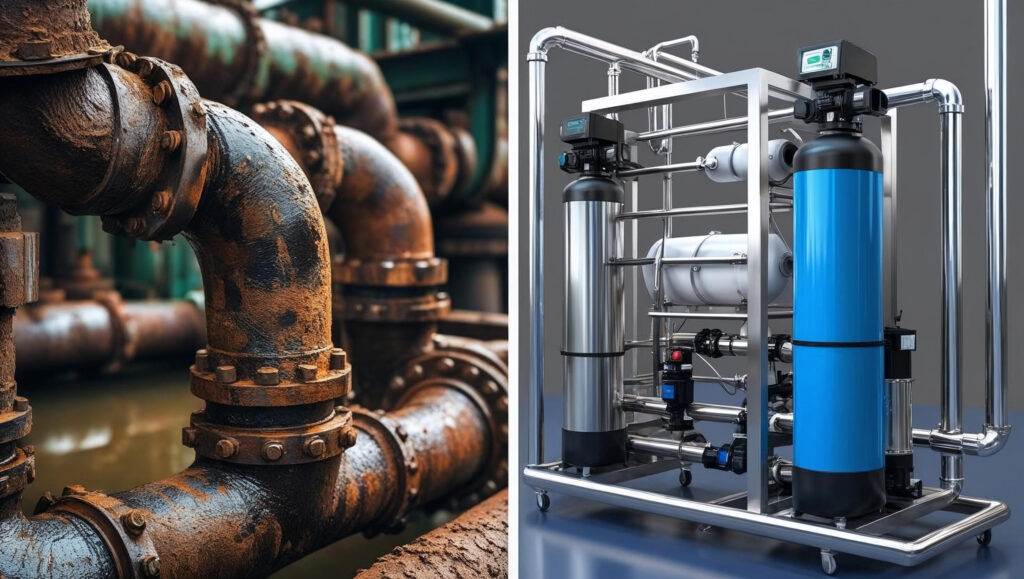In today’s complex industrial landscape, water isn’t just a utility; it’s a critical component, a solvent, a coolant, and sometimes even an ingredient. From pharmaceutical manufacturing to power generation, food and beverage processing to electronics assembly, the quality of the water used directly impacts everything from operational efficiency and product integrity to equipment lifespan and regulatory compliance. If you’ve ever struggled with inconsistent product batches, persistent equipment fouling, or skyrocketing maintenance costs, you might be overlooking the silent culprit: inadequate water quality. And the secret to unlocking superior water quality? More often than not, it’s the power of Industrial Reverse Osmosis (RO).
Let’s be real: tap water, or even conventionally treated industrial water, is often a mixed bag. It can contain a surprising cocktail of dissolved solids like calcium, magnesium, sodium, and chlorides, along with organic matter, bacteria, viruses, and even microscopic particles. While these might not be immediately visible, their cumulative effect on your industrial processes can be devastating. They lead to scale buildup on heating elements, corrosion in pipes, contamination in sensitive products, and a general drag on efficiency. This is where Industrial RO steps in, not as a mere filter, but as a precision purification system designed to deliver water purity far beyond what traditional methods can achieve.

Unveiling the RO Advantage: Beyond Basic Filtration
So, what exactly is Industrial RO, and why is it considered the gold standard for achieving superior water quality? At its heart, RO is a membrane-based filtration process that works on a remarkably simple, yet incredibly effective, principle. Imagine a semi-permeable membrane, a barrier with pores so tiny that they allow only water molecules to pass through, while rejecting almost everything else.
Here’s how it works: Untreated water is pumped under high pressure against this membrane. The water molecules, being small enough, are forced through the microscopic pores, emerging as highly purified “permeate.” The larger dissolved solids, salts, organics, and other contaminants are left behind, concentrated on the other side of the membrane, and then flushed away as “concentrate” or “reject” water.
This fundamental process allows Industrial RO systems to remove up to 99% of dissolved salts, particles, colloids, organics, bacteria, and pyrogens from water. This level of purification is what truly sets it apart from conventional filtration methods like sand filters or carbon filters, which primarily target suspended solids or chlorine. With RO, you’re not just cleaning the water; you’re fundamentally transforming its composition to achieve exceptional purity.
The Pillars of Superiority: Why RO Makes a Difference
The impact of this superior water quality cascades through various aspects of your industrial operations, bringing tangible benefits that directly affect your bottom line and reputation.
1. Uncompromising Purity for Critical Applications
For industries where water is a direct ingredient or plays a critical role in product integrity, RO is indispensable. Think about:
- Pharmaceuticals: Producing sterile injectables, active pharmaceutical ingredients (APIs), or laboratory reagents requires water free of endotoxins, bacteria, and trace elements. RO is a foundational step in achieving Pharmacopoeia-grade water.
- Food & Beverage: Consistent taste, appearance, and shelf-life of beverages, bottled water, or processed foods depend heavily on the absence of taste-altering minerals or contaminants.
- Electronics Manufacturing: The tiniest particle can short-circuit a microchip. RO-purified water is essential for rinsing and processing sensitive electronic components.
- Boiler Feed Water: High-pressure boilers demand extremely pure water to prevent scaling and corrosion, ensuring efficient steam generation and prolonging boiler life.
In these scenarios, RO isn’t just an option; it’s a non-negotiable requirement for product quality and safety.
2. Enhanced Operational Efficiency and Cost Savings
Superior water quality directly translates to superior operational performance. When your process water is pure, you eliminate many common headaches:
- Reduced Scaling and Fouling: The removal of hardness minerals means significantly less scale buildup on heat exchangers, pipes, and membranes in other systems (like cooling towers). This keeps your equipment running efficiently and reduces the need for frequent chemical descaling.
- Lower Energy Consumption: Clean heat transfer surfaces mean less energy is needed to heat or cool fluids. Pumps don’t have to work as hard against internal resistance caused by scale.
- Minimized Chemical Usage: With fewer impurities in the water, the need for chemical inhibitors, dispersants, and other treatment chemicals is drastically reduced, leading to substantial savings on chemical procurement and disposal.
These efficiencies compound over time, leading to significant long-term cost reductions.
3. Extended Equipment Lifespan
Poor water quality is a leading cause of premature equipment failure. Scale, corrosion, and biological growth relentlessly attack internal components. By providing demineralized water, industrial RO acts as a protective shield for your valuable assets, including:
- Boilers and cooling towers: Less scale means less stress on materials, preventing tube failures and extending operational life.
- Piping systems: Reduced corrosion means fewer leaks and pipe replacements.
- Process machinery: Any equipment that comes into contact with water will benefit from higher purity, reducing wear and tear.
Investing in RO is, in essence, investing in the longevity of your entire plant infrastructure.
4. Environmental Responsibility and Sustainability
In an increasingly water-stressed world, sustainable practices are paramount. Industrial RO systems, when properly designed and operated, can play a key role in your company’s environmental stewardship:
- Water Recycling and Reuse: The high purity of RO permeate makes it suitable for various reuse applications, significantly reducing your reliance on fresh water sources and minimizing wastewater discharge.
- Reduced Chemical Footprint: Lower chemical usage not only saves money but also reduces the environmental impact of chemical manufacturing and waste.
The Verdict: Purity is Power
The secret to superior water quality in industrial settings isn’t a complex, mystical formula. It’s the proven, reliable technology of Industrial Reverse Osmosis. By meticulously removing impurities, RO delivers water of unmatched purity, safeguarding your equipment, optimizing your processes, ensuring product excellence, and contributing to a more sustainable operation. If you’re looking to elevate your business performance and secure a competitive edge, investing in the purity delivered by industrial RO is a secret worth sharing.
